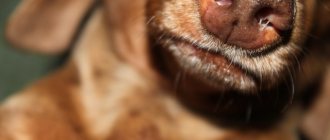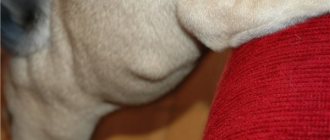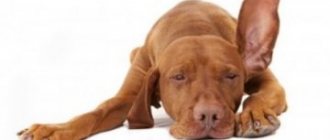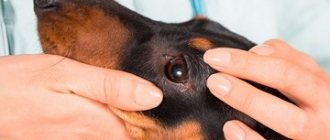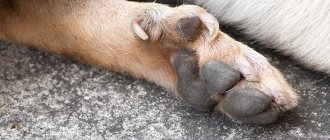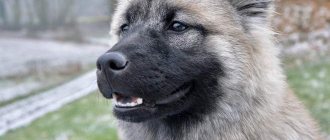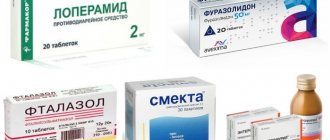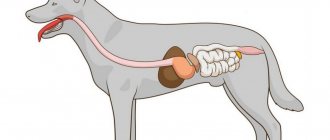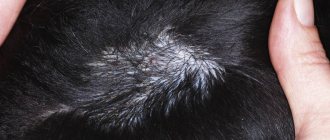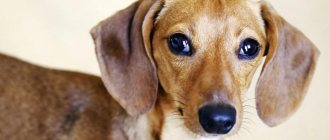There is a common belief among pet lovers that a dog's nose should be cold and wet. If it is hot, then this is a sign of illness.
Dog experts say that this is not so. There are several reasons when a pet's nose is warm, but the animal is not sick.
It is important to understand the reasons for this condition in a dog and learn to distinguish malaise from simple overwork.
Causes
There are conditions when a dog’s nose is not cold, but this is not associated with pathological changes.
The condition can be triggered by the following factors:
- Changes in air temperature and humidity. Walking in hot or frosty weather can lead to changes in the dog's physiological norms. As soon as the animal is at home, in its familiar environment, the nose will again become wet and cold.
Preparation for competitions. Service or show dogs experience significant stress during this time, so their nose may become dry and warm.- Insufficient air humidity in the room during the heating season.
- Change of teeth in puppies.
- Period of sleep or awakening.
- Stress, nervous excitement, fear.
- Allergic reaction.
- Lack of water in the pet’s body (low fluid intake).
- Age: In older dogs, the nasal mucosa gradually changes. In puppies, the process of thermoregulation has not yet been established, so there may be deviations from the norm.
In other cases, the onset of the disease is suspected.
There's no reason to worry
In what cases is a warm and dry nose not a cause for concern?
Age or individual characteristics of the pet
It is not uncommon for small puppies to have warm noses. If in general nothing has changed in the baby’s behavior, then there is no need to worry. The puppy will grow up, and everything will return to normal.
There are cases when some dogs always have a warm nose. This is already an individual feature. It’s just that the nasal mucosa in such animals is “passive”. And for them this is the norm.
The dog is sleeping or has just woken up
Pets that lead a calm and measured life lose the need for anxiety and a sensitive state during sleep. They do not need to be constantly on the alert, worry and catch with their nose the slightest changes in the environment. They sleep calmly and peacefully. The nose is also resting. Therefore, during sleep, the nose is dry. But as soon as the mustache wakes up, everything immediately returns to normal.
Overwork
For several hours in a row, your four-legged animal actively swam, ran and jumped. And when he returned home, he “fell without his hind legs” and does not react to anything. And the nose is dry and warm.
Don’t worry, it’s just that your little toothy has lost strength due to active pastime. He'll rest a little and everything will be fine again.
Stress
A dog can also have a dry nose when it is afraid of something or is nervous. Monitor your pet's emotional state. Try to provide him with the most comfortable and calm environment possible.
Weather
Extreme heat or cold can also cause a dry, warm nose. Under the scorching rays of the sun, the skin on a dog's nose, like a person's, can burn.
In extreme heat, try to provide the animal with the most comfortable conditions possible: shade, plenty of drink and access to water. How to do this, read about how to protect your dog in the heat.
The same applies to severe cold. Severe frost can cause your nose to become dry and even cracked.
Microclimate in the house
Sudden temperature changes, air conditioning and heating very dry the skin. If the air in the apartment is dry, not only the dog, but also everyone in the household will have problems with dry skin.
Pregnant or lactating bitches
A warm and dry nose in pregnant or lactating bitches is considered normal.
We've looked at cases where a warm, dry nose is not a cause for concern. Now let's talk about when a pet's dry nose is a sign of a particular disease.
Additional symptoms
If your pet's nose remains dry and hot for more than 3 hours, pay attention to additional signs. They will tell you what kind of disease is developing in the animal’s body.
Snot
A frequent companion of colds or hypothermia. If there is no fever, the animal is given rest, wrapped warmly, and provided with sufficient drinking water.
Rapid breathing
This is a sign of stress. When there is psycho-emotional stress or heavy loads, the animal’s breathing quickens.
The dog breathes frequently if the air temperature rises. As the degrees drop, the pet's breathing becomes uniform.
Lethargy
With almost all diseases, the dog becomes lethargic. It could be a viral infection, a cold, or fatigue. In this case, accompanying symptoms are monitored.
Drooling
This is an alarming symptom that accompanies rabies. In the acute course of the disease, the animal dies within a few days. To prevent this from happening, your four-legged friend must be vaccinated against rabies every year.
Doesn't eat anything
The dog often refuses to eat if there are any health problems. It could be a viral infection or a cold.
If refusal to eat is accompanied by lethargy or increased body temperature for more than a day, contact a veterinary clinic.
Hot paws
This sign indicates an increase in the animal’s body temperature as a whole. If the symptom does not go away within 24 hours, it is accompanied by other signs of infection (lethargy, apathy, refusal to eat) and contact a veterinarian.
Warm nose in hot weather
This sign indicates that the animal is overheating. The dog is taken from the street to a cool room and given a sufficient amount of drinking water. As a rule, after an hour the nose becomes wet and cold.
Therapy
If the animal is seriously ill, treatment is prescribed by a doctor. For acute colds, helminthiasis, and various injuries, therapy is carried out in a clinic under the supervision of a veterinarian. Medicines are also prescribed by a specialist.
In case of heat stroke, stress, or exertion, the animal is given rest and sufficient amounts of drink and food. The room is ventilated and the bedding is changed regularly.
The duration of walks in the heat is reduced, and the dog is not given serious exercise for several days.
For superficial injuries of the nose, the tissues are treated with an antiseptic and a calendula-based ointment is applied. If the wound does not heal for a long time, go to a veterinary hospital.
There is no cure for distemper or rabies. Your pet can be protected from these serious diseases by annual vaccination . Vaccination is the only protection for your four-legged friend against viral infections.
Your dog has a warm, dry nose - don't panic
Don't be alarmed if you touch your pet's nose and find that the dog has a warm, dry nose . In some situations this may be the norm. Well, sometimes this is really a symptom that deserves attention and requires a trip to the veterinarian. In this article we will look at why a dog may have a hot and dry nose .
First of all, you need to understand why your dog has a wet and cold nose. Most mammals have a wet nose. And only humans and a couple of primates do not have such an amazing property. A dog's nose is covered with mucus, which is produced by the glands lining the nose. With the help of this mucus, the dog's wet nose can sense even the slightest air movements.
A dog's nose is a kind of gas-liquid chromatograph. When molecules of volatile substances land on the tip of a dog's wet nose, they move at different speeds, which allows the dog to better understand the odors coming to it. This is why dogs are great at identifying different smells. This is roughly how the inside of a person’s nose is structured. A dog's sense of smell is several thousand times stronger than a human's. For a dog, the main sense organ is the nose. And it must be wet so that the dog can define itself well in this world.
In what cases can a dog's nose be dry?
A dog may have a dry and warm nose while sleeping or only after waking up. Also, if your dog ran into other dogs on the street or its owner bought her a new gadget puller (an article about this interesting tool for dogs here) and worked with her for about 20 minutes, then she is simply physically tired and her nose will be dry.
If it is incredibly hot outside or, on the contrary, brutally cold, then the dog’s body will react with a warm nose. In general, a dry nose is a reason to be more careful
Source
When not to worry
First you need to decide what kind of nose a healthy dog should have. Normally it is damp and cold. There are reasons when the olfactory organ dries out, but this is not a pathology.
A warm nose in a dog is not a sign of illness when:
the pet walked for a long time in the cold or heat;- he is allergic to household chemicals or plastic dishes (the owner should remove the allergen);
- the dog did not drink for a long time, especially in dry and hot weather;
- My nose got dry while I was sleeping.
If within an hour or two after sleep or a walk the animal's olfactory organ becomes damp and cold again, there is no need to worry. Most likely the pet was overheated or thirsty.
Causes of a hot nose in a dog
If your pet's nose suddenly becomes hot, do not rush to panic. Not all reasons indicate a pet’s illness. Immediately after sleep, a dog’s nose is dry and warm - this is the norm. After physical activity, a long walk or play, when your pet is overheated, the nose may also be warm and dry.
But if the nose becomes wet while the animal is calm, then perhaps there is stress or a change of situation.
Very often, a dog’s sense of smell may be dry due to allergies. Allergies, in turn, can be caused even by plastic dishes from which the dog eats. Detergents, dust, pollen, and certain foods can all cause allergies. If you notice that your pet is prone to allergic reactions, you should keep a food diary, write down food items in it and track your pet's body's reactions to what he eats. This will make it easier to eliminate the allergen from your dog’s diet.
Heat, cold, or strong winds can also cause changes in nasal dryness. The animal's immune system fights the effects of bad weather. The dog may also experience sneezing, nasal congestion, and coughing. In this case, you need to contact your veterinarian to prescribe treatment. As soon as your pet recovers, his nose will also return to its normal physiological state.
If your pet does not have water in his bowl, especially in hot weather, and the animal is experiencing a lack of fluid, this can also cause a dry nose.
It happens that an injury sustained by a pet causes swelling and swelling, which in turn causes a dry nose. Be sure to contact a specialist at a veterinary clinic to relieve symptoms and avoid complications.
Why does my puppy have a dry and warm nose?
Everyone is accustomed to the fact that a dog’s dry nose indicates illness. In a sense, this is true, although it is not an absolute truth.
Causes of a dry nose in a puppy
One of the most common causes of a dry, hot nose in a puppy is allergies. It can often occur on low-quality plastic, for example, from which a small pet’s toys or its food and water bowls are made.
An allergic reaction can also occur to pollen, dust, and chemicals (for example, detergents). Also, some breeds (usually decorative) have an allergic reaction to certain foods. A dry nose can also signal that your dog has a cold. And then she may experience other symptoms, such as:
In addition, the nose can dry out when it is injured. Then you can notice swelling, swelling, scabs or ulcers on it. A dog can also develop an autoimmune skin disease called pemphigus.
Having noticed this symptom, it is worth replacing plastic bowls with stainless steel utensils, and toys with higher quality ones.
If you suspect that your animal is allergic to a food product, it is better to consult a veterinarian for help.
If your dog is also exhibiting other cold symptoms, it can be relieved by applying calendula ointment to the tip of its nose.
If the animal’s body temperature also increases, then it is necessary to contact a veterinarian, as in the case of suspected pemphigus or injury.
Before you panic about your pet's dry nose, it's worth finding out in what situations this is completely normal. For example, a dog’s nose becomes dry and hot during sleep, from overwork (for example, after running for a walk), during nervous excitement or stress.
Source
